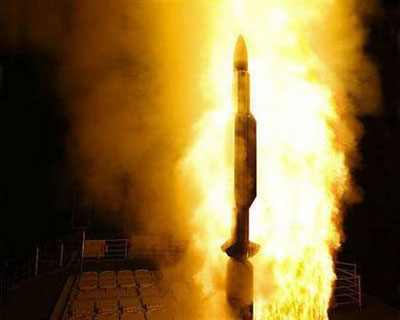Bull's eye: Missile hits toxic tank
Updated: 2008-02-22 06:40
HONOLULU: A US Navy cruiser blasted a disabled spy satellite with a pinpoint missile strike that achieved the main mission of exploding a tank of toxic fuel 210 km above the Pacific Ocean, defense officials said.
 |
|
A Standard Missile-3 (SM-3) is launched from a guided-missile cruiser in an image courtesy of the US Navy. A missile fired from a US Navy warship hit a defunct spy satellite in space to try to prevent its toxic fuel tank from crashing to Earth, the Pentagon said on Wednesday. [Agencies] |
Destroying the satellite's onboard tank of about 450 kg of hydrazine fuel was the primary goal, and a senior defense official close to the mission said yesterday that it appears the tank was destroyed, and the strike with a specially designed missile was a complete success.
Defense Secretary Robert Gates ordered the shootdown, which came late on Wednesday (yesterday morning Beijing time) as he began an eight-day, around-the-world trip on which he likely will face questions about the mission.
The elaborate intercept may trigger worries from some international leaders, who could see it as a thinly disguised attempt to test an anti-satellite weapon - one that could take out other nations' orbiting communications and spy spacecraft.
While Pentagon officials stressed that the satellite strike was a one-time incident, it certainly will spin off massive amounts of data and research that can be studied by the military as it works to improve its missile defense technologies.
Officials had expressed cautious optimism that the missile would hit the bus-sized satellite, but they were less certain of hitting the smaller, more worrisome fuel tank.
In a statement released after the satellite was shot, the Pentagon said: "Confirmation that the fuel tank has been fragmented should be available within 24 hours."
But a short time later, several defense officials close to the situation said it appeared the fuel tank was hit. One said observers saw what appeared to be an explosion.
Because the satellite was orbiting at a relatively low altitude at the time it was hit by the missile, debris will begin to re-enter the Earth's atmosphere immediately, the Pentagon statement said.
|
|||
Gates approved the missile launch at about 1840 GMT, while en route from Washington to Hawaii.
Within nine hours - at 0326 GMT yesterday - the USS Lake Erie fired the SM-3 missile originally designed to knock down incoming missiles rather than orbiting satellites.
It hit the satellite about three minutes later as the spacecraft traveled in polar orbit at more than 27,000 kph.
The Lake Erie and two other Navy warships, as well as the missile and other components, were modified in a hurry-up project started in January. The missile alone cost nearly $10 million, and officials estimated that the total cost of the project was at least $30 million.
The operation was so extraordinary, with such intense international publicity and political ramifications, that Gates - and not a military commander down the chain of command - made the decision to pull the trigger.
Timothy J. Keating, chief of US Pacific Command, told reporters shortly before the strike that he made calls to a number of international leaders to alert them to the mission.
China and Russia both expressed concerns about the shootdown in advance, saying it could harm security in outer space.
The government organized hazardous materials teams, under the code name "Burnt Frost," to be flown to the site of any dangerous or otherwise sensitive debris that might land in the United States or elsewhere.
President George W. Bush approved the shootdown mission last week, deciding it was important to destroy the toxic hydrazine fuel to prevent any possible injuries if the satellite came down in a populated area.
Agencies
|
|
|
||
|
||
|
|
|
|





